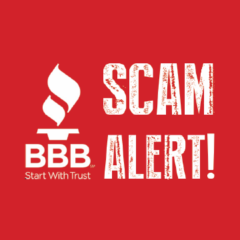
Impersonation scams, particularly regarding the government, are one of the highest reported scams targeting senior citizens. They can involve you revealing personal identification information or giving money to scammers. The Better Business Bureau (BBB) Serving Central SC and Charleston spreads awareness on what these scams look like, how to avoid them, and what to do if you’ve been scammed.
These types of scams involve a fraudster posing as a government agency like Medicare, the Internal Revenue Service (IRS), Social Security Administration (SSA), Federal Trade Commission (FTC), and more. This scam can be carried out through phone call, email, text, or social media. Once you pick up the phone or respond to a message, the fraudster may ask you to verify things like your Medicare number, social security number, or ask you to send money. Some may be aggressive and threaten you if you don’t give them your information.
How to avoid the scam:
Do not send money. These scammers will ask you to send money via wire, gift cards, cryptocurrency, or a payment app so that the money cannot be traced. A government agency will not ask or threaten you to send money.
- Do not give out personal information. This could put you at risk. If you want to check if the call is legitimate, hang up and call that government agency’s phone number.
- Be wary of Caller ID. Scammers can alter their Caller ID name to whatever they choose, so it is not a proper indication of who is calling.
- Avoid clicking on links. Malicious links can be placed in text messages and emails as a way to hack the device you are accessing it on.
There is some general information surrounding these government agencies that will be helpful in deducing if you are being scammed or not. For example, the IRS will initially contact you via mail, so if you receive a call or email, it is likely a scam. You will never be threatened to be arrested over the phone by a government agency. Medicare will never reach out to you first about a payment or ID number unless you call them first. Knowing this information is crucial to protecting yourself and avoiding these types of scams.
What to do if you’ve been scammed:
- Stop contact with the scammer. Do not message, call, or continue to make any payments to the scammer.
- Change your account passwords. Things like your bank account or email could be compromised, so it is important to attempt to cut off access.
- Report the scam. You can report a scam to the FTC at ReportFradu.ftc.gov or use our scam reporting service at BBB.org/ScamTracker.
- Protect your identity. If you gave away personal information, visit IdentityTheft.gov for more information on how to protect your identity.
To find and report scams to the BBB, visit BBB.org/ScamTracker.
Sources:
https://consumer.ftc.gov/articles/how-avoid-government-impersonation-scam



